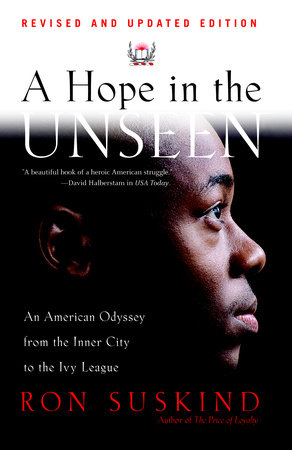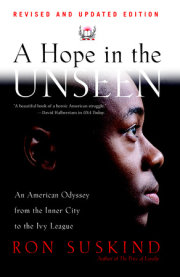The next morning blooms into a radiant, cloudless day, as it ought to be. Freshmen arrive for orientation, ferried by a grand procession of proud parents.
Barbara, tired from the drive, gets a late start and, before long, the day feels harried. It's nearly noon by the time they get to College Hill, a steep slope on top of which Brown sits like a cloud city above the gritty ethnic enclaves, legendary Italian restaurants, and aging factories of Providence. "I wanted to get this all done early. Now look," she says, sitting in the van near the Brown student union as Cedric, looking at a checklist in his orientation packet, slips out to go get his temporary student ID. "Don't be all day, Lavar," she calls after him, all business, "I gotta get back home."
Cedric has drawn a desirable dorm, Andrews Hall. It's a three-story brick horseshoe on the quieter Pembroke side of campus that was renovated over the summer and now boasts fresh carpeting and new paint. From the Andrews parking lot, they unload the van swiftly, with Cedric helping on this end. While Barbara glances tersely at other parents--mostly white, of course--unloading Lexuses and Range Rovers and Volvo wagons, she notices that Cedric seems to be increasingly relaxed--smiling at some of the other incoming freshmen and offering unsolicited greetings.
"These dorms are nice," Barbara notes over her shoulder to Cedric, who is dragging a trunk full of linens behind her across the second-floor hallway carpet. Remembering Cedric's complaints about last summer's dorms, she adds, "And a lot nicer than MIT, ain't it?"
"Lot nicer," he says, almost shouting. "This place is nothing like MIT."
A small paper square taped to the door of room 216 says "Cedric Lavar Jennings and Robert Burton." Cedric fumbles with the key and opens the heavy wooden door.
"Wow," he says.
"Hmmm, very nice," Barbara confirms.
His roommate, Rob, has already been here, settled in and gone. Barbara moves to the empty bed and starts unpacking while Cedric goes back downstairs for the rest. She carefully places a dozen new pairs of underwear, a dozen new pairs of socks, and six new T-shirts (clothes bought with money she didn't have to spare) onto closet shelves, and she begins a ritual that she figures is being repeated at this moment in hundreds of rooms across the campus: a mother making her child's bed for the last time. It's not like Barbara made his bed back home, she muses, but it doesn't matter. She made a thousand beds before she was twenty, and now she meticulously presses flat a fold of sheet, tucking it tight. Cedric returns, carrying his CDs, and crosses the room to check the unfamiliar titles in Rob's collection as Barbara lays the blanket and smoothes it.
With the van unpacked and their stomachs growling, Barbara decides they should walk to one of the dining halls for lunch. Soon, she and Cedric are strolling the campus, through archways and across neatly edged rectangles of thick grass.
While Barbara is delighted that Cedric, so tightly wound yesterday, is now buoyantly bouncing as he walks, an unwanted self-consciousness is welling up inside her. She'd rather not notice the cars other parents are driving, the clothes they're wearing, and the ease with which they move. She knows, of course, that the typical Brown parents probably went to college and on to some professional status that their offspring, by virtue of this Ivy League acceptance, are now bounding toward. Here, it's a day for her to be proud, but she can't help staring at them--these smiling, polished people--and overhearing their jaunty melody of generational succession: a child's footsteps following their own, steps on a path that leads to prosperity's table and a saved seat right next to Mom and Dad.
Barbara, watching Cedric demolish a ham sandwich at the dining hall, tries to figure out what she brings to this place, where she fits. It's her day, too, she resolves, looking across a dining hall filled with effusive, chatty parents and freshmen, though her song is flat and elemental--an old, familiar harmony, really, about sacrifice and denial and a child venturing where the parent never could.
"Really is a whole 'nother world up here," she says quietly across the table as Cedric reaches for her untouched sandwich, barely noticing that she's there. In that instant, she realizes how afraid she is that she might lose him.
It's almost two o'clock when they head back to the dorm. Near the new, soaring brick medical school, Cedric spots a bumper sticker on a parked car: "Your Honor Student Was Beaten Up By My Kid" it says, a play on the honor student bumper stickers that are especially popular in the inner cities.
"That car must be from D.C.," he jokes, and Barbara puts her arm around him as they laugh.
A tall, thin Caucasian girl with hazel-blue eyes, a row of earrings, and a shaved head strolls by. "Isn't that awful," Barbara murmurs to Cedric after the girl passes. "Must be chemotherapy." He nods sympathetically.
A few blocks ahead, passing a lovely Victorian house just north of Andrews dorm, Barbara admires the wide, circular porch and an apple arbor alongside it. "That fruit could feed a lot of hungry people," she says as they walk the last few feet to the dorm. Inside Cedric's room, they're puttering around when the door opens. It's a smallish white boy with dark hair, a faint Van Dyke beard, and sandals.
"You must be Rob," says Cedric with a wide smile.
"You must be Cedric," he echoes back in a soft, cheery voice.
Barbara nods a hello at him and rises from Cedric's bed. She knows that the time has come. In a moment, she and Cedric go down the elevator and outside and begin walking the last block to the van. She doesn't want to lead and senses that he doesn't either, so their pace slows until they're almost weaving--like they're not going anywhere, really. But as he looks down at his feet, she's able to glimpse the side of his face without him knowing. And Barbara Jennings can't help but hear echoes of her earlier self, holding a baby a little too tight, saying, "I'll save you, and me, too."
At the bumper of the van, he looks up.
"You be good, okay?" she says.
"Yeah . . ."
"Come here," she finally says, holding her arms out wide, and the two fall together as she presses her cheek hard against his.
"Trust in God, let Him guide you," she whispers.
"I will, Ma."
They hug for a good, long time. She's not been a mother to show him much physical affection in these latter years. The situation demanded strength. She had to be a father, too, as best she knew how, and maybe that hardened her touch. So, as they pull apart, she finds that her cheeks are flushed. She shakes it off.
"Okay, now," Barbara says. She reaches into the back seat and gives him a Frito-Lay assortment pack, uneaten from the trip. He nods. She gets into the front seat and waves once, and Cedric begins ambling down the hill toward the dorm.
"Wait!" She spots his deodorant in the space between the seats and yells through the open window. He runs the few feet back to get it.
"All right, 'bye," she says, and he turns, briskly walking back to the dorm as she watches him in the rearview. He doesn't look back.
Barbara is quiet as the van eases into gear and drifts onto the quiet street. She told herself she wouldn't cry, so she tries to occupy her eyes, looking at things she passes by. That Victorian would sure be nice, she thinks to herself, heading past the wraparound porch.
But something's wrong. She snaps to attention. The money!
Next thing, she's back in the dorm parking lot and then running up the stairs, taking them two at a time.
The door to room 216 bursts open. "I forgot this," Barbara says, panting, and squeezes three neatly folded twenties into her son's hand. Already, though, the room belongs to Cedric Lavar Jennings, a Brown freshman, and that nice white boy on the other bed. She feels suddenly unsure. Cedric is smiling broadly but like he's looking right through her. "Well, good-bye Lavar," she says simply and slips out. Doesn't hug him this time. She'd think a lot about that later.
It takes a moment for the heavy oak door to swing on its hinge. And when it slams, it's like a thunder clap, leaving her alone with the smell of fresh paint.
Copyright © 1998 by RON SUSKIND. All rights reserved. No part of this excerpt may be reproduced or reprinted without permission in writing from the publisher.








